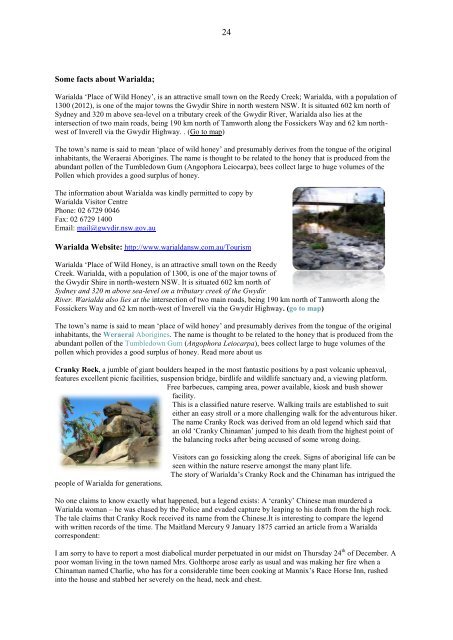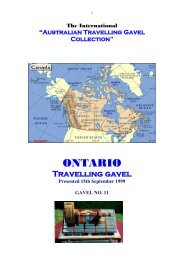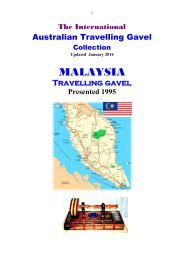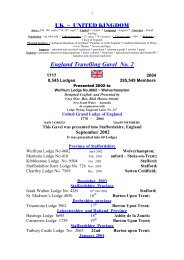TAMWORTH
Read more - Travelling Gavels
Read more - Travelling Gavels
- No tags were found...
You also want an ePaper? Increase the reach of your titles
YUMPU automatically turns print PDFs into web optimized ePapers that Google loves.
24<br />
Some facts about Warialda;<br />
Warialda ‘Place of Wild Honey’, is an attractive small town on the Reedy Creek; Warialda, with a population of<br />
1300 (2012), is one of the major towns the Gwydir Shire in north western NSW. It is situated 602 km north of<br />
Sydney and 320 m above sea-level on a tributary creek of the Gwydir River, Warialda also lies at the<br />
intersection of two main roads, being 190 km north of Tamworth along the Fossickers Way and 62 km northwest<br />
of Inverell via the Gwydir Highway. . (Go to map)<br />
The town’s name is said to mean ‘place of wild honey’ and presumably derives from the tongue of the original<br />
inhabitants, the Weraerai Aborigines. The name is thought to be related to the honey that is produced from the<br />
abundant pollen of the Tumbledown Gum (Angophora Leiocarpa), bees collect large to huge volumes of the<br />
Pollen which provides a good surplus of honey.<br />
The information about Warialda was kindly permitted to copy by<br />
Warialda Visitor Centre<br />
Phone: 02 6729 0046<br />
Fax: 02 6729 1400<br />
Email: mail@gwydir.nsw.gov.au<br />
Warialda Website: http://www.warialdansw.com.au/Tourism<br />
Warialda ‘Place of Wild Honey, is an attractive small town on the Reedy<br />
Creek. Warialda, with a population of 1300, is one of the major towns of<br />
the Gwydir Shire in north-western NSW. It is situated 602 km north of<br />
Sydney and 320 m above sea-level on a tributary creek of the Gwydir<br />
River. Warialda also lies at the intersection of two main roads, being 190 km north of Tamworth along the<br />
Fossickers Way and 62 km north-west of Inverell via the Gwydir Highway. (go to map)<br />
The town’s name is said to mean ‘place of wild honey’ and presumably derives from the tongue of the original<br />
inhabitants, the Weraerai Aborigines. The name is thought to be related to the honey that is produced from the<br />
abundant pollen of the Tumbledown Gum (Angophora Leiocarpa), bees collect large to huge volumes of the<br />
pollen which provides a good surplus of honey. Read more about us<br />
Cranky Rock, a jumble of giant boulders heaped in the most fantastic positions by a past volcanic upheaval,<br />
features excellent picnic facilities, suspension bridge, birdlife and wildlife sanctuary and, a viewing platform.<br />
Free barbecues, camping area, power available, kiosk and bush shower<br />
facility.<br />
This is a classified nature reserve. Walking trails are established to suit<br />
either an easy stroll or a more challenging walk for the adventurous hiker.<br />
The name Cranky Rock was derived from an old legend which said that<br />
an old ‘Cranky Chinaman’ jumped to his death from the highest point of<br />
the balancing rocks after being accused of some wrong doing.<br />
people of Warialda for generations.<br />
Visitors can go fossicking along the creek. Signs of aboriginal life can be<br />
seen within the nature reserve amongst the many plant life.<br />
The story of Warialda’s Cranky Rock and the Chinaman has intrigued the<br />
No one claims to know exactly what happened, but a legend exists: A ‘cranky’ Chinese man murdered a<br />
Warialda woman – he was chased by the Police and evaded capture by leaping to his death from the high rock.<br />
The tale claims that Cranky Rock received its name from the Chinese.It is interesting to compare the legend<br />
with written records of the time. The Maitland Mercury 9 January 1875 carried an article from a Warialda<br />
correspondent:<br />
I am sorry to have to report a most diabolical murder perpetuated in our midst on Thursday 24 th of December. A<br />
poor woman living in the town named Mrs. Golthorpe arose early as usual and was making her fire when a<br />
Chinaman named Charlie, who has for a considerable time been cooking at Mannix’s Race Horse Inn, rushed<br />
into the house and stabbed her severely on the head, neck and chest.







